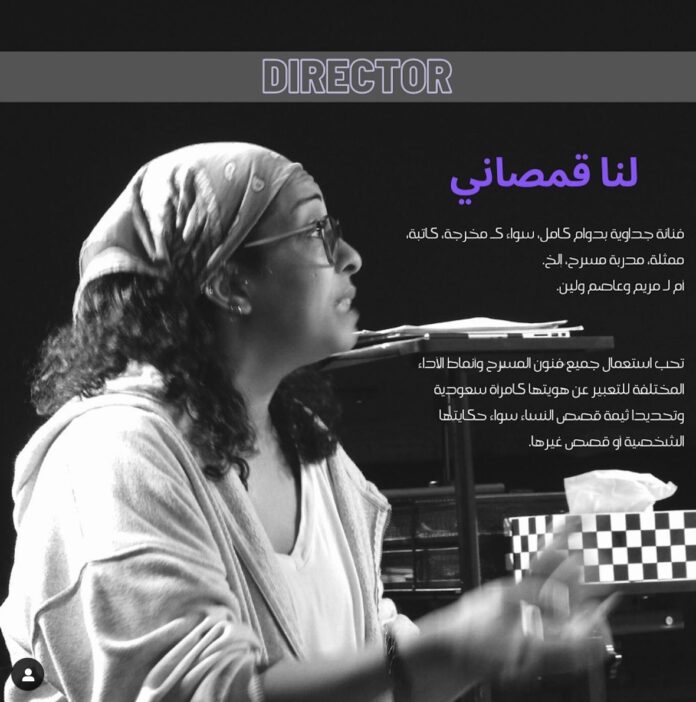JEDDAH: On the occasion of International Women’s Day on Wednesday, Lana Komsany put on the empowering play “I am Woman” at the Fennec, a theater in Hayy Jameel, Jeddah.
The performances in Arabic showcased about half a dozen women-centric vignettes, touching upon heart-wrenching and taboo issues that women in Saudi Arabia face regularly and exploring themes of grief, domestic violence, rape and single motherhood and personal triumph.
There was singing, there was crying, there was laughter and there was drama galore.
“I always make sure that I’m using my art to shed light (on these topics) and use it as a tool for change…We’ve been through a lot of change,” Komsany told Arab News.
When Arab News asked Komsany to describe herself, her first words were: “I’m Saudi.”
To her, the narratives shown on the stage are deeply rooted in her identity as a Saudi woman.
Armed with a bachelor’s degree in theater and two decades of experience, this play was perhaps the feat she was the most eager to tackle.
The shame that arises from negative experiences begins to disappear once survivors tell their stories out loud, Komsany explained, and Saudi women are not immune from the same struggles as women in other parts of the world.
“I’ve been trying to put this play on for four years,” Komsany told Arab News. In 2023, she said, it was time to bring it to life.
The performances are based on true stories, Komsany said, and while she was eager to not focus solely on her own experiences and instead share those of other women, the last story is indeed based on her marriage of 10 years.
“I was supposed to perform it, but I feel better with somebody else performing it,” she said.
“I lived (through) a very abusive marriage and I’m totally okay with sharing it and I wish other people would talk about it more. It’s a process we go through. I’m not condemning anybody who doesn’t feel ready to talk about it yet.”
The finale shows a veiled bride who is happy at first, having succeeded in what society deems is women’s ultimate goal, but soon the fa?ade fades and it becomes clear she has been trapped within an abusive and toxic marriage, with bruises visibly on her body.
The veil, first a source of joy, turns into a suffocating noose. The actress twirls around like she is trapped in a cocoon as dramatic music follows her frantic movements across the stage. She wants to break out and, eventually, she emerges much as a butterfly — free.
While many of the performances carry elements from her own story, Komsany was being mindful of the women in the community and inserted their voices alongside hers.
“I’m a single mom, and I have three kids and, and, alhamdulillah, I do live back in my mom’s house and I am blessed with a lot of things. Of course, I am aware of the dark side of motherhood — being raised by a single mom, as well. And I have a lot of people around me that are single moms and it’s a daily struggle. There’s an ugly side to it,” she said.
The women on stage during the performances were barefoot, with the exception of a young girl in one of the scenes.
Shoes are a visible symbol throughout the play and in the area around it. The concept of walking a mile in a woman’s shoes is interpreted both literally and figuratively.
Audience members were asked to bring their own shoes from home to donate to Komsany’s community-driven impromptu art installation at the space. The shoes were put into clear plastic bags and displayed on a shelf.
While Komsany is mindful of the sensitive content and potentially triggering aspects of the show, her age restriction was intended to be a guide.
“My daughter attended the show and she’s 11. So, we had an age limit but, again, I made it clear that it depends on how your conversation is with your child,” she said.
It was important for the creators of the play to showcase it in a place that is free so that purchasing a ticket would not be a restrictive barrier for anyone.
Komsany wanted a greater number of people to see it, so she held two shows a night for three days.
Waad Janbi, the play’s assistant director and an accomplished feminist writer, said: “When Lana asked me to be a part of the play last year and showed me the script, I said yes immediately.”
It was important to Komsany to go beyond her own narrative and to tell a story about women’s collective experiences, Janbi said.
“After the first show, I realized it wasn’t just my personal story with my mother, but the women I knew, the women I didn’t know who came before me and those who would come after me. I believe in the universe’s energy that connects us all,” Janbi said. “It is about reminding us of that feminine energy that all of us have.”
The show was supported by contributions from members of the local community as well as sponsors Emkan Education and Contentzilla. Food for the crew and the audience was provided by the Damascus Al-Rawaq restaurant and Helah bakery.
At the end of each performance, small snack boxes were offered to each audience member.
Performances start at 8:00 p.m. followed by a 9:30 p.m. show. The last shows will be held on Friday.

